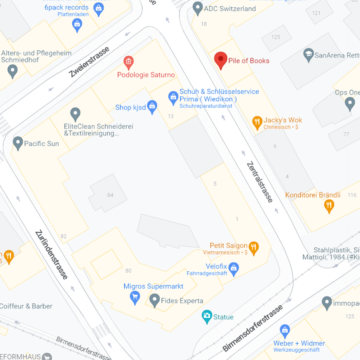by Rafaël Newman
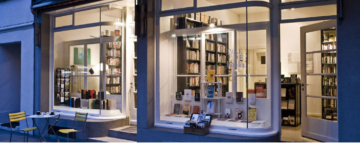 My favorite bookstore closed this month. Well, my favorite bookstore in Zurich, where I live. Also it hasn’t actually closed, it’s only changing hands. But Pile of Books, opened in 2007 by Daniel Nufer and run by him and his wife, Verena Nufer-Huber, until two weeks ago, has been such an expression of Dani’s character that it is hard to imagine the form it will take in his absence.
My favorite bookstore closed this month. Well, my favorite bookstore in Zurich, where I live. Also it hasn’t actually closed, it’s only changing hands. But Pile of Books, opened in 2007 by Daniel Nufer and run by him and his wife, Verena Nufer-Huber, until two weeks ago, has been such an expression of Dani’s character that it is hard to imagine the form it will take in his absence.
There have been other bookstores in my life, of greater or lesser importance to me depending on my phase of development. There was for instance the gift shop on Saint Catherine Street, in Montreal, the city of my birth, where my grandparents took me in the mid-1970s to pick out a Passover present (actually my ransom for finding the afikomen), and I, in an early gesture of perversity, chose a glossy album commemorating the Tutankhamun exhibition. Then there was Britnell’s, at Yonge and Bloor in Toronto, the city in which I came of age following our move from Quebec in the wake of the Révolution tranquille—a shop now long gone but in the late 1970s an invitingly Dickensian emporium, and the site of my first agonized Christmas gift-buying with an embryonic disposable income. Later, after my departure from Canada, there was Micawber Books, the explicitly Dickensian shop in Nassau Street, in Princeton, New Jersey, where I had my copy of Time’s Arrow signed by its author, Martin Amis, who was in town to give a coruscating talk on American socio-politics and to reminisce about his childhood on campus when his father lectured at Princeton in the 1950s.
There was the Heinrich-Heine-Buchhandlung, formally part of the Bahnhof Zoo in Berlin but only accessible from outside the railway station. Hunkered down under a noisy viaduct, it had opened in 1945 by permission of the Soviets, then of the DDR, who controlled the train facilities in West Berlin as well as East until 1990, and was thus the first bookstore to reopen in Berlin following the end of the war. I visited it while a student at the Freie Universität in 1990/1991, in the final years of the Buchhandlung’s existence, and was mesmerized by its juxtaposition of the eponymous romantic poet’s portrait with the shop’s ironbound environs. Later, during a dissertation-writing year spent in Paris, I would frequent À Tout Lire, an independent bookstore off the beaten path near Place Gambetta in the 20th arrondissement, where I purchased Slavoj Žižek’s latest collections of Hegelian knee-slappers, Flaubert’s encyclopedia of received ideas, and Michel Onfray on the Cynics. And, later still, there was the London Review Bookshop in Bloomsbury, hard by the British Museum and the fabled offices of Faber & Faber, where Tom, the jovial salesperson, scoffed at my (by then waning) grad-school enthusiasm for Žižek, but happily sold me Alan Bennett’s excellent slim volume of essays on six English poets.
There have of course been still other shops: there was Paragraphe, in Montreal, where I first encountered the now broadly franchised bookstore/café hybrid; there were Pages, This Ain’t The Rosedale Library, The Bob Miller Bookroom, and She Said Boom, all in Toronto and all first-rate, though not all, alas, extant today; in Berlin there were Motzbuch (until 2020), in Schöneberg, run by a local historian, and Bücherbogen am Savignyplatz, the art and architecture specialists still operating in Charlottenburg; and in Seattle there was the Elliott Bay Book Company, just south of our home in Capitol Hill during the mid-1990s and an indispensable source of printed comfort to the inhabitants of that “homesick city”.
Today, in Zurich, where I have lived with my family for a quarter of a century, we still enjoy a relative wealth of independent bookshops, spiting the scourge of Amazon and the concomitant spread of big brick-and-mortar chain stores: at Central, for instance, there is Klio, an austere purveyor of literary and academic titles (with its adjoining vintage shop, or Antiquariat) which serves as the de facto bookstore of the two universities that peer down on the Swiss city’s version of Potsdamerplatz by the Limmat River; there is Calligramme, not far up the Limmat in the picturesque Niederdorf district, from 1984 until 2020 run by the baby-voiced Helen Lehmann and then taken over by a team of bibliophiles who could not bear to see her overstuffed treasure house disappear; then there is Never Stop Reading, which opened not long ago near Lenin’s former digs in the Old Town, while in the gentrifying Industriequartier there is Sec52—each of these is the “public house” or outlet of a small local publisher (Scheidegger & Spiess and bilgerverlag, respectively) while also offering a wide range of titles in German and English; and there is the Buchhandlung am Hottingerplatz, run by Cornelia Schweizer and Heidi Häusler in a district legendary in the annals of Zurich’s literary life. When the bookshop, in its original location on the other side of Hottingerstrasse, fell on hard times, it was successfully reborn across the street thanks to shares bought by its loyal customers. (A competition was held to celebrate the Buchhandlung’s reopening, to which I submitted an epyllion.) Payot, however, Zurich’s last proper French-language bookshop, was not able to count on the same grass-roots support. First obliged to share quarters with a venerable art-book dealer, Payot was then swallowed up, along with its host, by the modest commercial giant Orell Füssli, a local chain whose lucrative side gig—printing money for the Swiss National Bank—makes it an unbeatable competitor. And finally, to this day, there is also Bücher Barth, in Zurich’s main railway station, likewise purchased by Orell Füssli following a change in family ownership but valiantly continuing to offer its own eclectic, trilingual range of literature, history, and philosophy.
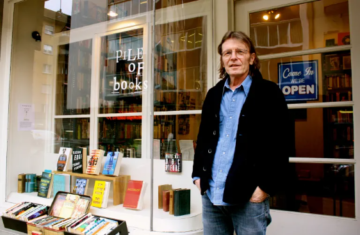
I have loved all of these bookstores in different ways—Paragraphe least of all, perhaps, because I’m not mad about the scent of coffee mingling with the perfume of print—but none of them has had the personal, autobiographical significance that has kept me returning over the years to Pile of Books. When Dani opened the place in 2007, he was making music (he’s a guitarist and connoisseur of American folk and blues) with a group of guys I had met that same year, and with whom I was soon to form a country-punk outfit called The NewMen. 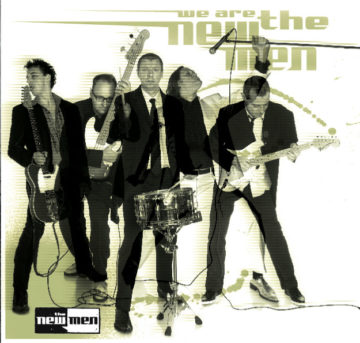 When we duly put out a first CD, We Are The NewMen, in an oversized sleeve designed to look like an old 45, Dani carried it in his shop, alongside conventional printed offerings. He also allowed us to play in his comfortably crowded premises: which performance, although unplugged, blew the dust off the top shelves. And when I published a book of my poetry, Live Long Enough (Happy Dragons’ Press ‘New Garland Series’ Number Twenty: Walthamstow, 2017), Dani took a shipment of copies on consignment from the press in London and helped out with a public reading and signing event. In fact, the last thing I did on the day we bade him farewell this past month, at an in-store occasion complete with music and refreshments to welcome the new proprietor, was to sign one of the two remaining copies of my book for sale to a friend and fellow customer.
When we duly put out a first CD, We Are The NewMen, in an oversized sleeve designed to look like an old 45, Dani carried it in his shop, alongside conventional printed offerings. He also allowed us to play in his comfortably crowded premises: which performance, although unplugged, blew the dust off the top shelves. And when I published a book of my poetry, Live Long Enough (Happy Dragons’ Press ‘New Garland Series’ Number Twenty: Walthamstow, 2017), Dani took a shipment of copies on consignment from the press in London and helped out with a public reading and signing event. In fact, the last thing I did on the day we bade him farewell this past month, at an in-store occasion complete with music and refreshments to welcome the new proprietor, was to sign one of the two remaining copies of my book for sale to a friend and fellow customer.
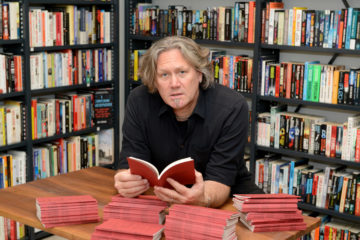
And all the while, all those years, I was ordering and buying books from Dani and Vreni: novels, essays, history, short story collections, volumes of poetry. Books by Michael Hofmann, Denise Mina, Ivo Andrić, Virginie Despentes, Donal Ryan, Tony Judt, Clare Hunter, Eric Kimmel, Pankaj Mishra, Joshua Cohen… I have ordered titles there for courses taught by my wife at Franklin University in Lugano, while our daughters, both alumnae of Franklin as well as of the University of Toronto, my alma mater, have also become regular customers, adding Kathy Acker, Hito Steyerl, Maggie Nelson, and Irvin Yalom, among many others, to the list of authors whose works Dani has obligingly procured. Best of all, I frequently stopped by Pile of Books looking for a birthday gift for someone, and was guided by Dani, following a brief description of that person’s character and predilections, to a title I would not have thought of myself, but which almost invariably fit the bill.
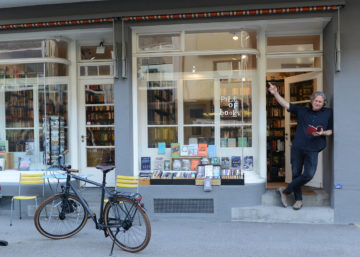
So the party two weeks ago was bittersweet. Dani and Vreni had advertised it with the motto GOODBYE/HELLO, a nod to the Ur-Rock n’ Roll of our common youth as well as in recognition of the happy fact that we would not only be parting ways with them, but also welcoming the shop’s new owner. That gentleman himself was of course in attendance, and made an appealingly modest speech between sets of Land, the charming guitar-and-glockenspiel duo who entertained us with covers of songs by an eclectic line-up including Steve Earle and Vera Lynn. A former client, the new owner recounted the way Pile of Books had kept him supplied with reading material during the first lockdown (I too received shipments of books from the shop in 2020, hand delivered by Vreni on her bicycle), and how depressed he had become when he heard that Dani would be retiring—whereupon his wife supported him in his wish to become an angel investor, and save the show. (He also offered the couple a slightly backhanded compliment by crediting Vreni with the financial survival of the shop, since Dani would typically be absorbed in the latest publications on Irish history, the Beat poets, or Bob Dylan: which, to be fair, jibes with my own fond impressions over the years.)
At this point in the evening, before we sang along with the promised pathos-drenched rendition of “We’ll Meet Again” and polished off the canapés set out in the used-book room at the back of the shop, someone needed to say a word of explicit thanks and farewell to Dani and Vreni, and I took the mike to deliver the following, not entirely ad-libbed remarks:
For fifteen years we’ve found our way
To this portal to the poets:
To raconteurs and romanciers;
To Celts, Canucks, and Croats.We knew the gateway to the greats,
To writers we admire,
Could be found between the humble straits
Of Birmensdorf and Zweier.1At Pile of Books we stilled our thirst
For English-language letters;
Our hosts were witty and well-versed,
And we their grateful debtors.And apropos: full many a franc
We’ve left here without weeping,
Since Pile of Books has earned our thanks
For negligent bookkeeping…
Drum sagen wir auf Wiederseh’n
Den beiden schönen Nufern:
Beglückwünscht sei’n sie, denn sie geh’n
Nun auf zu neuen Ufern!
The final quatrain, as corny in German as the preceding four are in English, takes advantage of the convenient fact that Dani’s last name rhymes with “Ufer”—shore, or bank; and that a clichéd German formula for announcing a person’s transition to a new job, or phase of life, imagines them setting out for “new shores”. And in fact, that is precisely how I envision Dani and Vreni: embarking on the Limmat, or the Liffey, a pile of books between them on deck, along with some honey and, perhaps, who knows, plenty of money, wrapped up in a five-pound note…
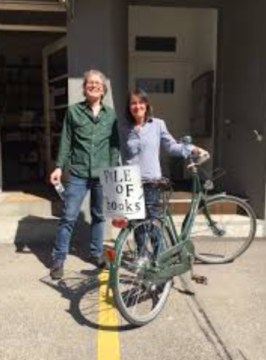
At any rate, I wish them smooth sailing, and happy reading!
_________________________________________
1 These are the names of the cross streets at either end of the bookstore’s block, to wit:
